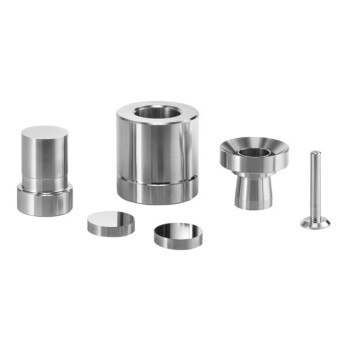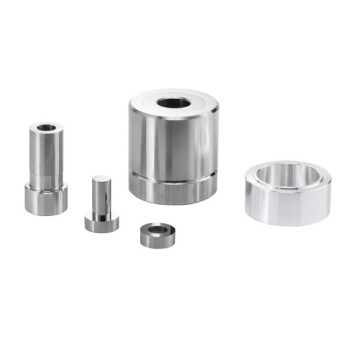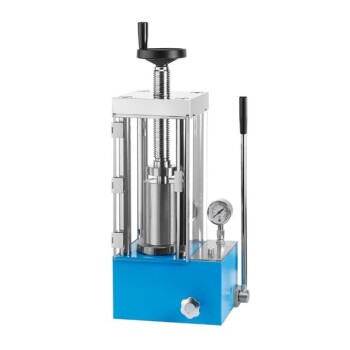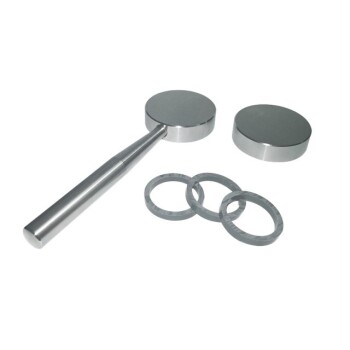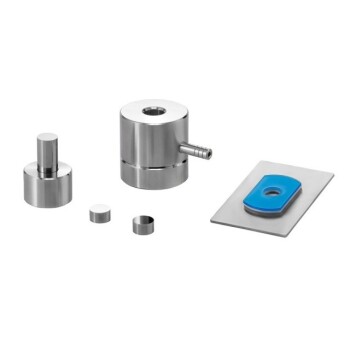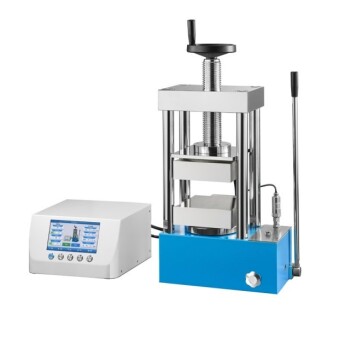At their core, compact and portable pellet presses are gaining popularity because they offer the full analytical performance of larger, traditional machines in a much smaller, more versatile footprint. This addresses the dual modern challenges of limited laboratory space and the increasing need for on-site, in-field material analysis. They deliver precision and power without the spatial or immobility constraints of older equipment.
The shift towards compact pellet presses is not merely a trend in miniaturization. It represents a fundamental change in workflow, empowering researchers and technicians to perform high-quality sample preparation wherever it is most effective—be it a crowded lab bench or a remote field site.

The Driving Forces Behind the Compact Design Trend
The rise of smaller, more powerful pellet presses is a direct response to the evolving needs of modern scientific and industrial environments. It's a convergence of efficiency, convenience, and capability.
Maximizing Laboratory Space
Modern laboratories are often densely packed with sophisticated instrumentation. Bench space is a premium, finite resource.
A compact, benchtop press frees up valuable area that would otherwise be occupied by a large, floor-standing unit. This allows for a more efficient and ergonomic lab layout.
Enabling On-Site and Field Analysis
The ability to move a press from the lab to a field location is a paradigm shift. It moves analysis from a delayed, centralized process to an immediate, on-site action.
This is critical for applications like environmental testing, geological surveying, or quality assurance on a factory floor. Technicians can prepare and analyze samples instantly, enabling rapid decision-making without the delay of transporting samples back to a central lab.
No Compromise on Performance or Customization
Crucially, the reduction in size has not come at the cost of performance. Advances in hydraulic engineering and materials science allow these compact units to generate the same high pressures as their larger counterparts.
This ensures the creation of high-quality, homogenous solid pellets required for sensitive analytical techniques like X-Ray Fluorescence (XRF) and Fourier-Transform Infrared Spectroscopy (FTIR). Furthermore, they retain the ability to use various die sets, offering the same sample preparation customization.
Understanding the Trade-offs and Considerations
While the benefits are significant, an objective assessment requires understanding the potential limitations of a compact design.
Throughput vs. Footprint
A compact manual or benchtop press is ideal for low-to-medium sample throughput. It is perfect for research, methods development, or low-volume QA.
However, for high-volume industrial labs that process hundreds of samples daily, a larger, automated floor press may still be more efficient due to its higher throughput and robotic handling capabilities.
Portability and Power Requirements
True portability depends on more than just the size and weight of the press itself. Field use requires a compatible power source, which might mean a heavy generator or battery pack.
You must also account for the transport of necessary accessories, including the die sets, sample materials, and cleaning supplies, which add to the overall weight and bulk of a field kit.
Maintenance Complexity
While robustly built, the smaller, more integrated components of a compact press can sometimes be more complex to service than the larger, more mechanically simple parts of a traditional floor press.
Consider the long-term serviceability and availability of parts, especially if the equipment will be used heavily in demanding field conditions far from technical support.
Making the Right Choice for Your Application
The decision to choose a compact press over a traditional one should be driven entirely by your primary workflow and operational goals.
- If your primary focus is high-volume, automated analysis: A larger, floor-standing press often provides the best throughput and integration with robotic systems.
- If your primary focus is maximizing space in a research or QA lab: A compact benchtop model offers the perfect balance of full performance and a minimal footprint.
- If your primary focus is on-site or mobile testing: A portable, compact press is the essential tool, enabling immediate sample preparation and analysis in the field.
Ultimately, aligning the equipment's form factor with your specific analytical needs is the key to maximizing both efficiency and the quality of your results.
Summary Table:
| Feature | Benefit |
|---|---|
| Compact Design | Maximizes lab space and allows for flexible placement |
| Portability | Enables on-site and field analysis for immediate results |
| High Performance | Delivers precise pressure for quality pellets in XRF/FTIR |
| Customization | Supports various die sets for diverse sample preparation |
| Efficiency | Ideal for low-to-medium throughput in research and QA labs |
Upgrade your laboratory with KINTEK's advanced pellet presses! Whether you're tackling space constraints in a research lab or need reliable on-site analysis in the field, our compact and portable lab press machines—including automatic lab presses, isostatic presses, and heated lab presses—deliver unmatched precision and durability. Experience seamless sample preparation for techniques like XRF and FTIR, tailored to your specific needs. Don't let equipment limitations hold you back—contact us today to discuss how KINTEK can enhance your workflow and drive better results!
Visual Guide

Related Products
- Automatic Laboratory Hydraulic Press Lab Pellet Press Machine
- Laboratory Hydraulic Press 2T Lab Pellet Press for KBR FTIR
- Laboratory Hydraulic Split Electric Lab Pellet Press
- Laboratory Hydraulic Pellet Press for XRF KBR FTIR Lab Press
- Manual Laboratory Hydraulic Press Lab Pellet Press
People Also Ask
- How do hydraulic press machines ensure precision and consistency in pressure application? Achieve Reliable Force Control for Your Lab
- How are hydraulic presses used in the preparation of powder mixtures? Achieve Precise Compaction for Accurate Analysis
- What are the advantages of using a hydraulic press for pellet production? Achieve Consistent, High-Quality Samples
- What is the purpose of creating pellets for XRF spectroscopy using a hydraulic press? Ensure Accurate and Repeatable Elemental Analysis
- What are the key steps for making good KBr pellets? Master Precision for Flawless FTIR Analysis









